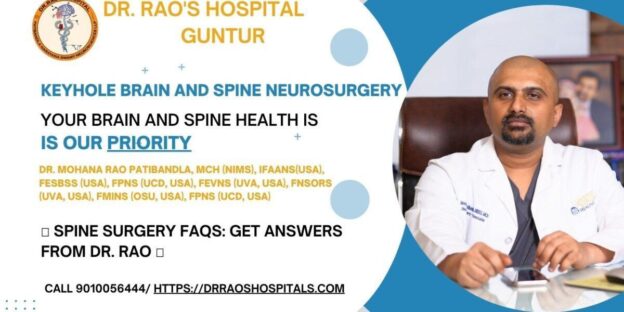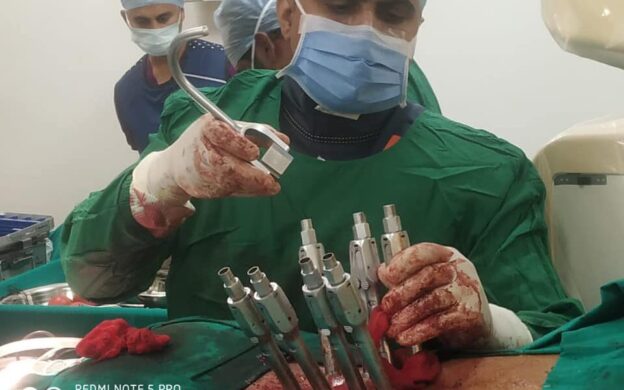Spine Surgery FAQs: Expert Answers by Dr. Rao
Summary: Explore the world of spine surgery with Dr. Rao as he addresses the most common questions about this intricate procedure. From understanding the different types of surgeries to post-operative care, this video aims to enlighten viewers about spine surgery and its potential benefits.
What is spine surgery?
Spine surgery is a surgical procedure that aims to correct spinal disorders or injuries.
What are the indications for spine surgery?
Spine surgery may be recommended for herniated discs, spinal stenosis, scoliosis, and spinal cord injuries.
What are the types of spine surgeries?
Spine surgeries include discectomy, laminectomy, spinal fusion, and artificial disc replacement.
What are the complications of spine surgery?
Complications of spine surgery may include infection, bleeding, nerve damage, and spinal fluid leakage.
What is the difference between open and traditional spine surgeries?
Open spine surgery involves making a large incision in the back to access the spine. Traditional spine surgery refers to any surgical procedure that is not minimally invasive.
What are the postoperative precautions after spine surgery?
Postoperative precautions after spine surgery may include avoiding bending or twisting the back, avoiding heavy lifting or strenuous activity, and following a physical therapy program.
What is the success rate of spine surgery?
The success rate of spine surgery varies depending on the type of surgery and other factors. According to an article on azcentral.com, the success rate for spinal fusion is 98 percent, the success rate for discectomy is 90 percent, and the success rate for laminectomy is 80 percent. However, another source on mayoclinic.org states that back surgery is rarely necessary and that most back pain improves within three months. Discussing spine surgery’s potential risks and benefits with your doctor is essential.
How long does it take to recover from spinal surgery?
The recovery time after spinal surgery varies depending on the type of surgery and other factors. According to an article on mayoclinic.org, recovery after spinal fusion surgery may take several months. Recovery after other types of spine surgeries may be shorter. Your doctor can provide more information about the expected recovery time for your specific procedure.
How long do I need to stay in the hospital after spinal surgery?
The length of hospital stay after spinal surgery varies depending on the type of surgery and other factors. According to an article on mayoclinic.org, hospital stays after spinal fusion surgery may range from several days to a week or more. Your doctor can provide more information about your specific procedure’s expected length of hospital stay.
Can I drive after spine surgery?
You should not drive after spinal surgery until your doctor gives you clearance. According to an article on mayoclinic.org, you may need to wait several weeks or more before driving after spinal surgery.
What are the risks of spine surgery?
The risks of spine surgery may include infection, bleeding, nerve damage, and spinal fluid leakage. Your doctor can provide more information about the potential risks of your specific procedure.
What is the difference between minimally invasive and open spine surgery?
Minimally invasive spine surgery involves making smaller incisions and using specialized tools to access the spine. Open spine surgery involves making a larger incision in the back to access the spine.
What is the recovery time for minimally invasive spine surgery?
Recovery time for minimally invasive spine surgery may be shorter than recovery time for open spine surgery.
What is the recovery time for open spine surgery?
Recovery time for open spine surgery may take several months.
What are the potential complications of spinal fusion surgery?
Potential complications of spinal fusion surgery may include infection, bleeding, nerve damage, and spinal fluid leakage.
What are the potential complications of discectomy?
Potential complications of discectomy may include infection, bleeding, nerve damage, and spinal fluid leakage.
What are the potential complications of laminectomy?
Potential complications of laminectomy may include infection, bleeding, nerve damage, and spinal fluid leakage.
What are the different types of spinal fusion surgery?
Several types of spinal fusion surgery include cervical and lumbar fusions, interbody fusions, and transforaminal interbody fusion. These procedures can be applied to any region of the spine (cervical, thoracic, lumbar)
Can I exercise after spinal surgery?
It would be best to not exercise after spinal surgery until your doctor gives you clearance. According to an article on laspine.com, walking is the first exercise you’ll likely perform after spinal fusion surgery, typically required for any patient before leaving the hospital¹.
What is spine surgery, and when is it recommended?
Spine surgery is a medical procedure to treat various conditions affecting the spine. It is typically recommended when conservative treatments like medication, physical therapy, or injections fail to relieve chronic back pain or neurological symptoms caused by spinal issues.
Who is Dr. Rao, and what role does he play in spine surgery?
Dr. Rao is a renowned neurosurgeon at Dr. Rao’s Hospital, specializing in spine surgery. With years of experience and expertise, he performs various spine surgeries using advanced techniques to achieve the best patient outcomes.
What conditions can be treated with spine surgery?
Spine surgery can effectively treat herniated discs, spinal stenosis, degenerative disc disease, spinal fractures, spinal tumors, and deformities like scoliosis.
How do I know if I need spine surgery?
Suppose you are experiencing persistent back pain, leg pain, weakness, numbness, or tingling that does not improve with conservative treatments. Consulting with a spine specialist like Dr. Rao is essential in that case. After a thorough evaluation and diagnostic tests, he will recommend the most suitable treatment, which may or may not include surgery.
What are the minimally invasive spine surgery options available?
Dr. Rao’s Hospital offers advanced minimally invasive spine surgery techniques involving smaller incisions, reduced tissue disruption, and quicker recovery times. Procedures like microdiscectomy, laminectomy, and spinal fusion can be performed using these minimally invasive approaches.
What are the benefits of minimally invasive spine surgery?
Minimally invasive spine surgery offers several advantages, including less post-operative pain, reduced blood loss, shorter hospital stays, faster recovery, and a lower risk of infection. It also results in more minor scars and less damage to surrounding tissues.
Is spine surgery risky, and what are the potential complications?
Like any surgical procedure, spine surgery does carry some risks. However, with Dr. Rao’s expertise and advanced techniques, the risk of complications is minimized. Potential complications may include infection, blood clots, nerve injury, and hardware-related issues.
How long does it take to recover from spine surgery?
The recovery period after spine surgery varies depending on the type of procedure performed and individual factors. Patients can often expect to resume normal activities within a few weeks to a few months after surgery.
Does Dr. Rao’s Hospital provide comprehensive spine care services?
Dr. Rao’s Hospital is a leading center for spine care, offering a comprehensive range of services, including diagnostic imaging, conservative treatments, minimally invasive and complex spine surgeries, rehabilitation, and follow-up care.
How can I schedule a consultation with Dr. Rao for a spine surgery evaluation?
To schedule a consultation with Dr. Rao for spine surgery evaluation or any spine-related concerns, call +91 9010056444 or visit drraoshospitals to book an appointment online.
Is spine surgery always necessary for treating back pain?
No, spine surgery is not always necessary for back pain. In many cases, conservative treatments such as physical therapy, medications, and lifestyle changes can effectively manage back pain without surgery.
How long does spine surgery typically take?
The duration of spine surgery varies depending on the complexity of the procedure. Minimally invasive surgeries may take a few hours, while more complex surgeries may last several hours.
Will I need to wear a back brace after spine surgery?
The need for a back brace after spine surgery depends on the type of procedure performed. Some surgeries may require a brace for support and stabilization during the initial recovery period.
What is the success rate of spine surgery?
The success rate of spine surgery depends on various factors, including the patient’s condition, the type of surgery, and the surgeon’s skill. Overall, spine surgery has a high success rate in providing pain relief and improving mobility.
Can I resume physical activities after spine surgery?
In most cases, patients can gradually resume physical activities after spine surgery. However, following the surgeon’s guidelines and avoiding strenuous activities during the initial recovery phase is essential.
Is Physiotherapy needed following the spine surgery?
Physical therapy is often integral to the recovery process after spine surgery. It helps strengthen the back muscles, improve flexibility, and enhance overall mobility.
Are there any alternative treatments to spine surgery?
Yes, there are alternative treatments to spine surgery, such as epidural injections, chiropractic care, and acupuncture. These treatments can be considered before surgery or in combination with surgical interventions.
What is the typical hospital stay after spine surgery?
The length of the hospital stay after spine surgery varies depending on the type of procedure and the patient’s overall health. Patients may often stay in the hospital for a few days to monitor their recovery.
Can spine surgery be performed on an outpatient basis?
Yes, certain minimally invasive spine surgeries can be performed on an outpatient basis, allowing patients to return home on the same day as the surgery.
Are there any lifestyle changes I should make after spine surgery?
After spine surgery, following the surgeon’s post-operative instructions, including any prescribed medications, physical therapy exercises, and lifestyle modifications, is essential. Avoiding smoking, maintaining a healthy weight, and practicing good posture can also promote a successful recovery.
As with any medical procedure, it is crucial to have a thorough discussion with your spine specialist to understand your specific condition, treatment options, and expected outcomes. Dr. Rao and his team at Dr. Rao’s Hospital are dedicated to providing individualized care and ensuring the best possible results for each patient.





